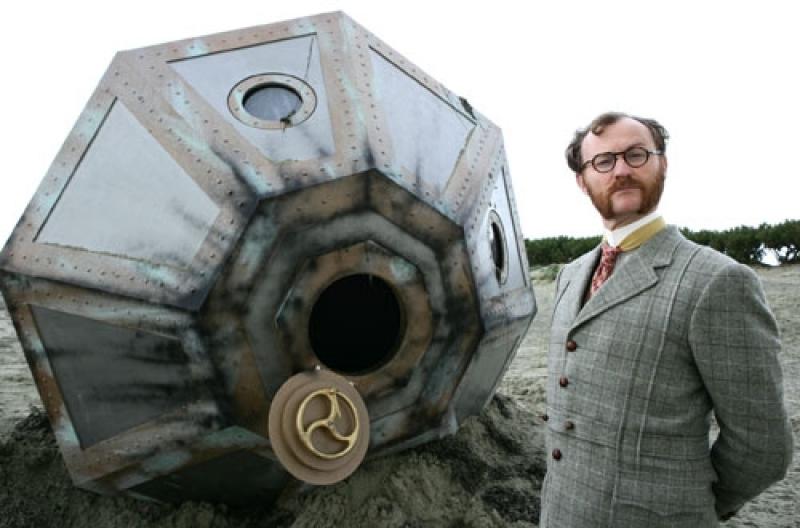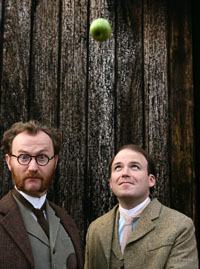The First Men in the Moon, BBC Four | reviews, news & interviews
The First Men in the Moon, BBC Four
The First Men in the Moon, BBC Four
Mark Gatiss shines in this captivating update of the H G Wells novel

Obviously the world has decided it needs Mark Gatiss, and it keeps finding things for him to do. An influential figure in the latterday revival of Doctor Who, as well as co-creator of the BBC's recent Sherlock, Gatiss's forte is turning out to be whimsical old-fashioned adventure stories, perhaps overlaid with a patina of science fiction.
In that case, what could be more appropriate than an update of H G Wells's novel The First Men in the Moon, originally published in 1901? The protagonist, the charmingly eccentric scientist and inventor Professor Arthur Cavor, could have been the Doctor Who of his era, with his enlightened views on progress and social harmony. The book's message about the evils of imperialist adventurism isn't really necessary in today's defence-cuts Britain, where it's beginning to look as if we'd struggle to mount a seaborne assault on the Beachy Head lighthouse. It's an enduringly fashionable viewpoint, nonetheless.
Once more, the Stakhanovite Gatiss led from the front, writing the script as well as taking the role of Cavor. Alongside him was Rory Kinnear - steadily morphing into the spitting image of his dad Roy - as Julius Bedford, a disreputable chancer ruined in a bad business deal and now scuffling around for any opportunity to make a fast buck. Having down-sized to a homely country cottage while trying to write a play, he found himself disturbed by the nutty Professor wandering past his front gate making peculiar absent-minded noises (Mark Gatiss and Rory Kinnear, pictured below).
 Long story short? The Prof has invented a gravity-defying substance called Cavorite, gets talked into partnering-up with Bedford who can't believe the money-making potential he has stumbled across, and develops a plan for travelling to the Moon in a Cavorite-powered module. Once you switch on the power, the Cavorite does its stuff and the little craft (a veritable proto-TARDIS) whizzes off into space.
Long story short? The Prof has invented a gravity-defying substance called Cavorite, gets talked into partnering-up with Bedford who can't believe the money-making potential he has stumbled across, and develops a plan for travelling to the Moon in a Cavorite-powered module. Once you switch on the power, the Cavorite does its stuff and the little craft (a veritable proto-TARDIS) whizzes off into space.
The First Men... was all about tone and underlying philosophy rather than cutting-edge sci-fi. Apart from anything else, Wells's story was ridiculous, positing a Moon with a breathable atmosphere, peopled by green beings who looked (as Bedford put it) like ants walking on their hind legs and who had developed a strange underground civilisation. Bedford's eyes lit up when they found lumps of gold scattered around the landscape, and seams of gold running through the rock strata. The Grand Lunar, who ran the place, looked like a big dollop of seaweed hanging from the rafters.
But the joy of the piece was its gentle, thoughtful tone, perfectly embodied by Gatiss as the Professor, whose sole ambition before he met Bedford had been to be elected a member of the Royal Society, that exemplary home of the gentleman-adventurer. His finest moment was his wistful reverie about how, if they were only able to remain long enough on the Moon, they would discover a wise and sophisticated civilisation who had built great underground cities, perhaps bordered by a mighty subterranean lake.
But Bedford had set the cat among the pigeons by killing a couple of their lunar captors, causing Cavor to foresee only interstellar colonisation, greed and war. The Prof's ultimate self-sacrifice to prevent interplanetary war did have the regrettable downside of wiping out all life on the Moon, but he meant well.
In rewriting the story, Gatiss had invented a new framework in which the 90-year-old Bedford told his tall tale to a young boy, on the day in 1969 when Neil Armstrong was about to take that small step, and giant leap, onto the lunar surface. A cute idea but an unnecessary one, since all it achieved was to throw in an extraneous layer of period recreation. On the bright side, there must be loads more of this sort of stuff that Gatiss could turn his hand to.
Add comment
The future of Arts Journalism
You can stop theartsdesk.com closing!
We urgently need financing to survive. Our fundraising drive has thus far raised £49,000 but we need to reach £100,000 or we will be forced to close. Please contribute here: https://gofund.me/c3f6033d
And if you can forward this information to anyone who might assist, we’d be grateful.

Subscribe to theartsdesk.com
Thank you for continuing to read our work on theartsdesk.com. For unlimited access to every article in its entirety, including our archive of more than 15,000 pieces, we're asking for £5 per month or £40 per year. We feel it's a very good deal, and hope you do too.
To take a subscription now simply click here.
And if you're looking for that extra gift for a friend or family member, why not treat them to a theartsdesk.com gift subscription?
more TV
 The Count of Monte Cristo, U&Drama review - silly telly for the silly season
Umpteenth incarnation of the Alexandre Dumas novel is no better than it should be
The Count of Monte Cristo, U&Drama review - silly telly for the silly season
Umpteenth incarnation of the Alexandre Dumas novel is no better than it should be
 The Narrow Road to the Deep North, BBC One review - love, death and hell on the Burma railway
Richard Flanagan's prize-winning novel becomes a gruelling TV series
The Narrow Road to the Deep North, BBC One review - love, death and hell on the Burma railway
Richard Flanagan's prize-winning novel becomes a gruelling TV series
 The Waterfront, Netflix review - fish, drugs and rock'n'roll
Kevin Williamson's Carolinas crime saga makes addictive viewing
The Waterfront, Netflix review - fish, drugs and rock'n'roll
Kevin Williamson's Carolinas crime saga makes addictive viewing
 theartsdesk Q&A: writer and actor Mark Gatiss on 'Bookish'
The multi-talented performer ponders storytelling, crime and retiring to run a bookshop
theartsdesk Q&A: writer and actor Mark Gatiss on 'Bookish'
The multi-talented performer ponders storytelling, crime and retiring to run a bookshop
 Ballard, Prime Video review - there's something rotten in the LAPD
Persuasive dramatisation of Michael Connelly's female detective
Ballard, Prime Video review - there's something rotten in the LAPD
Persuasive dramatisation of Michael Connelly's female detective
 Bookish, U&Alibi review - sleuthing and skulduggery in a bomb-battered London
Mark Gatiss's crime drama mixes period atmosphere with crafty clues
Bookish, U&Alibi review - sleuthing and skulduggery in a bomb-battered London
Mark Gatiss's crime drama mixes period atmosphere with crafty clues
 Too Much, Netflix - a romcom that's oversexed, and over here
Lena Dunham's new series presents an England it's often hard to recognise
Too Much, Netflix - a romcom that's oversexed, and over here
Lena Dunham's new series presents an England it's often hard to recognise
 Insomnia, Channel 5 review - a chronicle of deaths foretold
Sarah Pinborough's psychological thriller is cluttered but compelling
Insomnia, Channel 5 review - a chronicle of deaths foretold
Sarah Pinborough's psychological thriller is cluttered but compelling
 Live Aid at 40: When Rock'n'Roll Took on the World, BBC Two review - how Bob Geldof led pop's battle against Ethiopian famine
When wackily-dressed pop stars banded together to give a little help to the helpless
Live Aid at 40: When Rock'n'Roll Took on the World, BBC Two review - how Bob Geldof led pop's battle against Ethiopian famine
When wackily-dressed pop stars banded together to give a little help to the helpless
 Hill, Sky Documentaries review - how Damon Hill battled his demons
Alex Holmes's film is both documentary and psychological portrait
Hill, Sky Documentaries review - how Damon Hill battled his demons
Alex Holmes's film is both documentary and psychological portrait
 Outrageous, U&Drama review - skilfully-executed depiction of the notorious Mitford sisters
A crack cast, clever script and smart direction serve this story well
Outrageous, U&Drama review - skilfully-executed depiction of the notorious Mitford sisters
A crack cast, clever script and smart direction serve this story well
 Prost, BBC 4 review - life and times of the driver they called 'The Professor'
Alain Prost liked being world champion so much he did it four times
Prost, BBC 4 review - life and times of the driver they called 'The Professor'
Alain Prost liked being world champion so much he did it four times

Comments
...